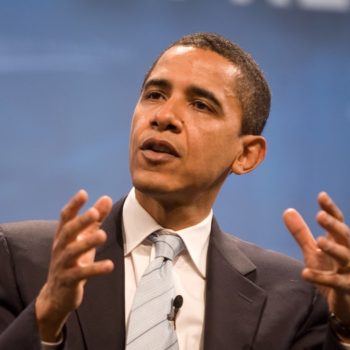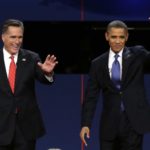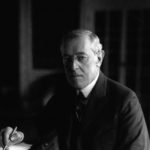It is fashionable these days to discuss the conflict between President Barack Obama’s pragmatism and his idealism.
Those on the left are dismayed by his willingness to compromise with conservatives on economic and fiscal issues, his incremental approach to foreign policy goals, and his “evolving” rather than firm commitments to social-justice issues like gay marriage.(a) Those on the right, meanwhile, object the moment Obama takes a principled liberal stand on anything, accusing him of dressing discredited social schemes in sophisticated rhetorical finery or of breaking his promise to govern cooperatively with Republicans. Neither side seems to understand that, in Obama’s view, there is no fundamental conflict between pragmatism and idealism. Indeed, when understood correctly, a commitment to deliberation, compromise, reflection, and recalculation in politics is quite a lofty ideal to uphold – yet it is one that leaders from Abraham Lincoln to Woodrow Wilson have considered essential to the meaning of democracy.
Obama’s philosophy clashes with some on both the left and the right in part because it harkens back to an earlier era – not that of Lyndon Johnson’s Great Society, or Franklin Roosevelt’s New Deal, but of a full century past. The president’s approach recalls a time when the philosophical pragmatism of William James was embraced by early-twentieth-century progressives determined to reform the methods of governing as much as its traditional goals.1 James used “pragmatism” to describe an idealistic but critical attitude toward human endeavors.(b) Pragmatism meant doing what worked, not what was easy; making informed decisions, not blind leaps of faith or fruitless compromises; judging ideas and acts by consequences, not ideological origins. Unfortunately, true pragmatism has long played a negligible role in American public life. Yet this neglected tradition of non-dogmatic idealism, with its new incarnation in Obama, may suggest ways to break the current stranglehold of ideological, partisan politics.
The philosophical foundations of pragmatism are, first, the idea that knowledge evolves as individuals test ideals and values against experience, and second, that truth should be measured by how well an idea solves problems while accommodating the rest of experience. Applied to politics, this philosophy suggests the pursuit of an, “ethical republic,” in which the people deliberate over the widest possible range of ideals and demands.2 James emphasized several virtues vital to an ethical republic. One was experimentalism: the willingness to reflect critically on our values and actions in light of experience and change them if necessary. Another was tolerance and empathy: the recognition that other people’s values were facts of experience against which ours must be tested, and which we should try to understand. Yet another was moral courage, which demanded commitment to ongoing reflection and deliberation, and acceptance that all moral choices sacrificed some values to realize others. James and other pragmatists felt the political ethos comprising these virtues was well-suited to the society and culture of the United States, a nation founded on the ideal of self-government through deliberative discourse.
Obama, consciously or not, has attempted to resurrect this pragmatist ethos, and in the process propose a massive overhaul of our contemporary political culture. Beginning in the 1970s, increasingly vocal cultural conservatives pitted themselves against liberals, cultural minorities, and feminists who had also grown harsher in denouncing America’s flaws. Contestants on all sides reduced one another and their positions to what Obama has aptly described as “caricatures.”3 By the mid-1990s ideological extremists controlled the national machinery and message of both parties, sometimes embracing a vicious attack politics.(c) As Obama explained in his 2006 book The Audacity of Hope, he sought to change this political culture: “I had clung to the notion that politics could be different and that the voters wanted something different.”(d) If offered a frank and civil alternative, he wagered, “the people’s instincts for fair play and common sense would bring them around,” and both “politics” and “policies” would change for the better.4 Taken at his word, Obama is attempting a difficult trick. He is trying to inspire, but to be frank; to be idealistic, but in a realistic way; to shape as well as adapt to circumstances; to both lead and listen. His approach to issues such as Supreme Court appointments, international diplomacy, abortion, and gay rights reflects this pragmatist view of politics, with frequent emphasis on deliberation, empathy, critical analysis, and the search for common ground.
Jamesian pragmatism combines an audacious “will to believe” with a humble skepticism, recognizing both human idealism and human fallibility as preconditions of an eternally improvable world.5 In fact, it takes the same view of human progress Obama expressed the night he won the presidency. His improbable election, he asserted, was an answer to those who questioned the power of American democracy, but an answer that had none of the finality we often demand. “There will be setbacks and false starts,” he warned, “This victory alone is not the change we seek; it is only the chance for us to make that change.” In other words, the answer to the perennial question, “Can we do better?” was not, “Yes, we did,” or even, “Yes, we most certainly will,” but rather, as Obama repeated throughout his campaign and victory speech, “Yes, we can.”6 For Obama, it is a blessing that our system, at its best, reflects rather than resists the process of continual evolution and experimentation admired by the pragmatists. “That’s the genius of America,” he explained on election night 2008, upon becoming yet another “first” in a society defined by such innovations – “that America can change.”
Endnotes
- For more on the pragmatist influences on Obama’s political philosophy, see James T. Kloppenberg (2011) Reading Obama: Dreams, Hope and the American Political Tradition, Princeton, NJ: Princeton University Press. For parallels to President Woodrow Wilson’s pragmatic politics, see Trygve Throntveit (May 21, 2012) “Obama and the New Freedom,” on The New York Times’ Campaign Stops blog.
- Trygve Throntveit (2011) “William James’s Ethical Republic,” Journal of the History of Ideas, 72(2): 255 – 277.
- Barack Obama (2006) The Audacity of Hope: Thoughts on Reclaiming the American Dream, New York: Vintage Books, p 148.
- Obama, The Audacity of Hope, p. 22.
- William James (1897) The Will to Believe, and Other Essays in Popular Philosophy, New York: Longmans, Green, p. 1-31. William James (1907) Pragmatism: A New Name for Some Old Ways of Thinking, New York: Longmans, Green, p. 43-74, 239-301.
- Barack Obama (2008) “Obama’s Victory Speech [4 November 2008],” The New York Times.
Sidenotes
- (a) Despite numerous public critiques of Obama by liberal leaders and organizations, his approval rating among Democrats has held relatively steady over the course of his term: it was 88% the week he was sworn into office and currently stands at 81%.
- (b) Pragmatism is one of a handful of Western philosophical movements that originated and developed primarily in America, rather than in Europe. Along with William James, Charles Sanders Pierce and John Dewey are considered the founding fathers of pragmatism.
- (c) The most well known measure of ideological polarization in Congressional voting records shows that polarization climbed significantly beginning in the early 1990s. By 2008, polarization was at its highest level in more than a century.
- (d) In a recent survey, the majority of voters (58%) gave Congress a grade of F on its performance, “keeping excessive partisanship in check,” and the same percentage said incivility is a, “major problem,” in Congress.





